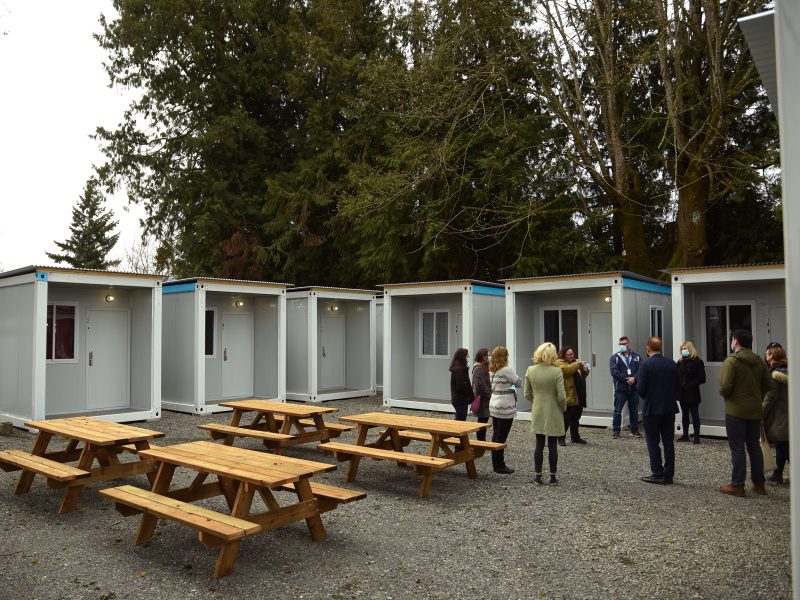
Local restaurants are eager and anxious for new rules that could allow for dine-in services to resume across British Columbia as soon as June 1. The industry is scrambling to get ready for customers in a new way, with more space between tables, new physical barriers, a preference for outdoor seating and other measures aimed at reducing the risk of spreading the coronavirus. But Cowichan region restaurants that rely on summer tourists face additional challenges to get customers in the door and make the financial picture work, for now and in the long run.
Even in normal years, “we lose massive amounts of money in the winter,” says Jacob Hokanson, owner of the Rock Cod Cafe in Cowichan Bay. “And it’s okay because we get to gain it back from tourist time.” With provincial officials continuing to discourage non-essential travel, many restaurants are trying to figure out how to make do without out-of-town theatregoers, foodies, recreationalists and others.
Hokanson says he should be able to get through the season with help from some of the government financial assistance programs. But if those supports go away too soon, it will be a wasted public investment, and many restaurants will still go bankrupt. “If they pull the pin too soon, it will be all for nothing,” he says. “They can’t stop what they’ve started.”
Slim margins

The restaurant industry relies on selling a lot of food on slim profit margins. Hokanson says his margins run between five and seven per cent. He says that if, as expected, restaurants will be allowed to reopen initially at only 50 percent capacity, it will be difficult for him to achieve a profitable volume of customers.
Thanks to a $40,000 Canada Emergency Business Account (CEBA) loan, he has been able to hire back some of his staff and make changes necessary to start selling takeout food last weekend. Hokanson lauds the Canadian government’s support of small businesses during the pandemic, including the wage subsidies, loans, the Canada Emergency Response Benefit and forthcoming commercial rent assistance.
“Maybe it’s magical thinking, but I’ve got to at least try,” he says. To increase his restaurant’s chances of survival, he says that he will unfortunately have to increase prices and probably close for a few months next winter.
He’s not alone. According to an April survey by Restaurants Canada, about half of independent restaurants expected they would close without rent support and ongoing financial assistance.
And with fewer tourists, it will be largely up to locals to prop up the industry. “We’re going to have to dig locally into our pockets to support everybody here for the next year or so,” says Ian Tostensen, CEO of the BC Restaurant and Food Services Association.
A pivot to local
This week, the Chemainus Theatre cancelled the remainder of its 2020 season. It is a huge setback for not only the theatre, but also for many businesses in Chemainus, including the Odika Cafe, located a block away from the theatre.
For the past 10 years, Odika chef and co-owner Murray Kereliuk has been serving up fine dining to theatre patrons, who he says make up more than 80 per cent of his customers. But restaurateurs have to be adaptable no matter the situation, he says, which is what he has been trying to do for the past month.
Odika has revamped its menu to feature lower-priced pub-style offerings for takeout, such as fish and chips, chicken wings and sliders. “Instead of trying to focus on theatre and tourists, we’ll be focusing on locals,” Kereliuk explains.
The response has been positive so far, he says. In fact, even when B.C. restaurants get the green light for dine-in fare, he says that Odika will probably stick with just takeout for a while. Physical distancing in a small restaurant such as his doesn’t leave much room for profit. Kereliuk says that he’s not sure it would be any better than takeout, which requires very low overhead.
“What’s the point of opening just to lose money — lose more money than you’re already losing?” he asks.
Out of reach
For some businesses, pivoting to local-friendly menus and takeout won’t cut it. The Genoa Bay Café relies on boaters, many from out of town, who dock at the Genoa Bay Marina as well as other visitors from afar. But the marina had been closed since April, leaving the café without much customer base to sell food to, says co-owner Diana Madsen. She has opted, so far, against opening for takeout only.

“We’re just honestly waiting for [provincial health officer Dr. Bonnie] Henry to open the doors and tell us how we can get people back in our restaurant,” Madsen says. She explains that a CEBA loan has made it possible to employ the restaurant’s chef and sous chef to secure their services until reopening. Thankfully, the Genoa Bay Café has “amazing” landlords willing to let them catch up on rent later this summer, Madsen adds.
The restaurant usually does the vast majority of its business between May 15 and Oct. 15, Madsen says. For her, the hardest part is trying to plan things such as staffing for a most unusual summer season. “What scares me most about this is I don’t know what’s coming.”
Business groups join eat-local push
Restaurants and business groups are working hard to encourage local patronage. Of course, many people’s pockets are lighter than ever, so it’s a daunting task for restaurants to bring back regulars, let alone attract new customers, amid a pandemic with no end in sight.
Tostensen, with the BC Restaurant and Food Services Association, says he hopes that municipalities are willing to try “big bold stuff,” such as closing downtown streets to vehicle traffic, to increase the amount of space available for patio dining.
He says that the Buy BC: Eat, Drink Local program launched this week will be more extensive and protracted than in past years.
Locally, the Duncan-Cowichan Chamber of Commerce has been providing resources for restaurants, including through the Cowichan Strong website and a Business (Not) as Usual Cowichan Facebook page, where local restaurants are posting their takeout menus. Executive Director Sonja Nagel adds that the chamber is looking into how it could help local businesses with a “be a tourist in your own town/community” campaign.
She says that she applauds how well many local restaurants are adapting to the new challenging circumstances, including some that are trying out alternative income streams.
Innovation and adaptation
Mother’s Day weekend is usually one of the biggest weekends of the year for the Alderlea Farm Café in Glenora, says co-owner Katy Ehrlich. This year, in addition to a special takeout menu on Sunday, Ehrlich is taking orders for Mother’s Day gift baskets filled with homemade, homegrown and other local items.

Typically, about 60 percent of the café’s clientele are tourists, Ehrlich says. But right now, the farm-to-table operation is more farm than table. She says that she and husband John are growing more vegetables than they have in recent years, and have decided to offer a community-supported agriculture (CSA) subscription for the first time in several years, where people can sign up for a weekly box of veggies through the end of September.
“Small business owners are innovators,” she says. “We get the pulse of what the community needs.”
Ehrlich says she can’t wait for the café to reopen, to seat people in an expanded patio area. And she hopes that some good may come out of the crisis. “It’s an opportunity for us to become more self-sufficient as a community.” [end]



